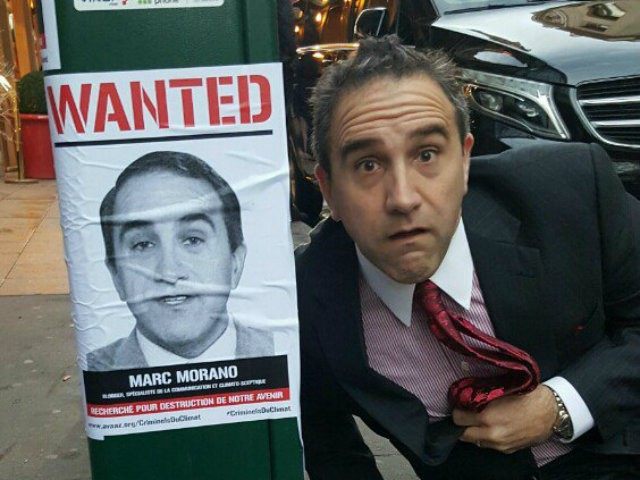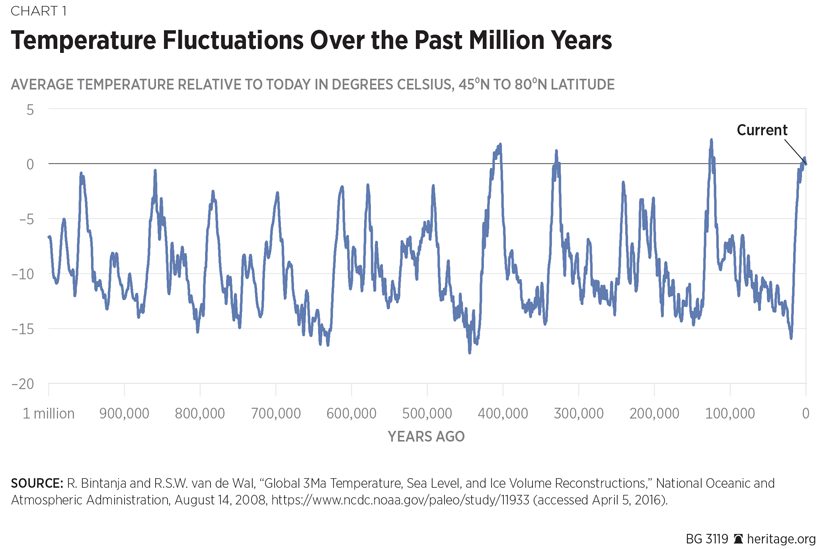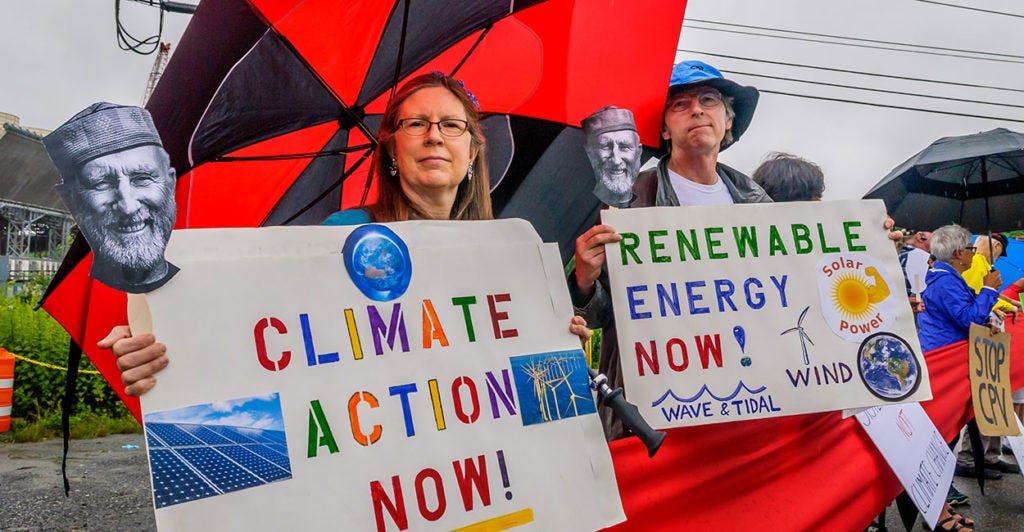Marc Morano, founding editor of the award-winning website ClimateDepot.com, recently authored “The Politically Incorrect Guide to Climate Change.” He spoke to Daily Signal Editor-in-Chief Rob Bluey about climate change myths and other facts you probably haven’t heard reported by the media. An edited transcript of their interview is below. You can also listen to it on The Daily Signal podcast.
Rob Bluey: What prompted your interest in the issue of climate change? There’s a great photo of you in the book next to a wanted poster. How did you become such a villain to the left?
Marc Morano: I always said I was a Republican, except when it came to environmental issues. I remember not liking James Watt, the former interior secretary. I remember not liking President Ronald Reagan’s environmental policies. I always wanted to be a forest ranger as a kid growing up. I got heavily involved emotionally in watching all the documentaries about the Amazon rainforest back in the 1980s and 1990s.
It wasn’t until I started reading Dixy Lee Ray and actually hearing her talk, it was actually on Rush Limbaugh’s show, the coverage of the Rio Earth Summit, that I started to look deeper into environmental issues. What I remember her specifically saying, as a nuclear physicist, Dixy Lee Ray, that the Amazon was one of the most intact forests and this idea that it’s about to disappear was complete exaggeration and hype. I started investigating that. It actually culminated in a documentary on the Amazon rainforest
>>> Buy the Book: “The Politically Incorrect Guide to Climate Change”
Global warming, when I started focusing on it, I actually started with a skeptical view and I was only able to get more and more skeptical, because I saw the same tactics being used.
The way I ended up in the wanted poster in Paris—that was the movie premier of my film “Climate Hustle” from 2015 at a Paris cinema. The environmental groups put out wanted posters of me the day of the premier. All over the city, this was literally on the main streets of Paris. So I posed with one of them in the book and you can see the picture. They called me a “climate criminal wanted for climate crimes.” This is the kind of intimidation they like to do.

Marc Morano, author of “The Politically Incorrect Guide to Climate Change,” in Paris. (Photo Courtesy of Marc Morano)
Bluey: Despite that intimidation, you’ve still gone on to write this book. So what prompted you to do that and what’s your goal when a reader picks it up? What do you want them to walk away with?
Morano: My goal here was to help conservatives and Republicans articulate the issue. During my time on Capitol Hill, I worked for the Senate Environment of Public Works Committee. I can’t tell you the horror stories, Rob, of being in high-level meetings, during the height of the cap-and-trade debate 2007, 2008, 2009; back when President Barack Obama was pushing this through all the way to 2010.
The staffers of very conservative Republican senators would be like, “Well, we don’t want to touch the science on this because we don’t want to be seen as against the Earth or against the environment. Let’s just solely focus on the economics.”
I remember arguing passionately. If people think we face the climate catastrophe, we’re Americans! They’re going to say we will bear any cost and overcome it. They never wanted to challenge it. So I’m trying to, and working for Sen. James Inhofe, we tried to challenge the science.
What I tried to do with this book is say it’s OK to espouse climate skepticism. The book is done for anyone from, I would say, sixth grade through highest levels of education to educate them with the top voices in science, the basic concepts, and to make it fun, informative in a talking point form.
This is a needed book because in order to fulfill President Trump’s policies, you need the scientific justification, and this book fills that gap in, as well as talks about the policy.
Bluey: The other thing the book has is a lot of great facts that I think counter what you so often hear in the media and from liberal politicians. Could you share some of them? I know you have examples right on the cover. For instance, let’s take hurricanes because we’re in the midst right now of another hurricane story. You hear this all the time—that these hurricanes are more intense, they’re happening more often because of climate change. You say, “No.”
Morano: Not only do I say “no,” but the peer-reviewed scientific literature clearly and overwhelmingly says “no.”
There is nothing unusual, particularly on extreme weather. It’s not just hurricanes. Hurricanes, floods, droughts, tornadoes, on the entire spectrum of extreme weather, we are either at stable or declining trends. And that includes droughts.
California droughts in previous centuries blew away anything we’re talking about now. Floods, no trends on 100-year, 85-year time scales. Hurricanes were much worse, many more powerful hurricanes in the 1940s and ’50s. In fact, we were in the longest period of no major hurricane category three or larger before last year’s big hurricanes hit. And even though there is this alleged record rains, in the 1960s hurricanes that hit Cuba had many more times rain and flooding events than that.
“They make it seem like extreme weather is everywhere. But taken as a whole, and in the peer-reviewed literature, it’s actually on a declining trend.”
I go into that in the book about these so-called 1,000-year floods and I explain that all these extreme weather events they claim, it’s kind of like a lottery promotion scam. Where they say, “Oh, this is a 1,000-year storm hit this city, and a 1,000-year storm hit that, this is unusual.” No, there are going to be very few lottery winners. But the lottery winners there are, they highlight them. “Look, there’s a lottery winner and there’s a lottery, look the lottery winners are everywhere.” They make it seem like extreme weather is everywhere. But taken as a whole, and in the peer-reviewed literature, it’s actually on a declining trend.
Interestingly enough, cold weather is actually more extreme than warm weather. In the 1970s, they blamed tornadoes, floods, even the threat of war and increased violence on global cooling at the time. So there’s just not the science there at all, when it comes to that. And also I go through all the other myths you’ve heard about from the hottest year on record, the hottest decade.
Bluey: Let’s tackle that one because we hear this one it seems month after month—another record-breaking month. At the same time, I love the chart that The Daily Signal published of the temperature throughout history. You see the lines going up and down. Tell us what we need to know.

Morano: First of all, in the book, I interviewed geologists, I have Nobel Prize-winning scientists endorse the book. They explain that in the geologic history of the Earth, we are in the coldest 10 percent of the geologic history of the Earth. In other words, 90 percent of our Earth’s history was too warm to have ice at either pole. So we are in the 10 percent coldest. That’s No. 1.
No. 2, if you go back to the Roman warming periods during the time that Jesus Christ walked the Earth—and I show this in the peer-reviewed studies in the book, in a very reader-friendly way—we are actually now cooler than we were. So we’ve cooled since the time Jesus Christ walked the Earth. We’re actually about the same temperature or cooler since the medieval warm period, since about 900 to 1300.
First of all, you say hottest year, what time scale? Then, you jump ahead to about 1850, the end of the Little Ice Age, where the New York river, New York Harbor froze over, the Thames river was frozen, it was a brutal period, coinciding with low sun spot activity and bunch of other factors.
Suddenly, we get thermometer data. So the thermometer data comes online right at the end of the Little Ice Age. It’s very cold. All these things you hear about the glaciers retreating, most of that glacier retreat happened by 1900. Now, 80 percent of the carbon dioxide came after 1940, or after World War II in 1945. We had a huge warm spell from the 1920s into the ’30s and then, we had a cooling period from the ’50s all the way up to about the late 1970s. I go into the whole global cooling scare.
“The so-called claims of the hottest year fall easily within the margin of error. That’s why it’s a political statement. It is utter nonsense from beginning to end.”
They now claim, “Oh, that never happened.” They have studies out, they claim that that was overblown, there’s only a couple scientists. I show in the book it was National Academy of Sciences, CIA, some of the same scientists warning of global cooling in the ’70s who then flipped and became global warming.
I actually feature in the book an article from the 1977 and ’78 in The New York Times, two articles. During this time, the scientists were battling it out when global cooling was morphing into a climate change, global warming.
To answer the question on the hottest year, we warm from the late ’70s to the late ’90s. Then essentially we flatlined. Essentially, there’s no statistically significant global warming. We had a thing called “the pause.” They didn’t like that, so they actually went back in the records and erased the pause. They changed the data.
Besides, even doing all that, the hottest year claims are within hundredths of a degree and that margin of error is tenths of a degree and they adjust the temperatures to within tenths of a degree without explanations. The so-called claims of the hottest year fall easily within the margin of error. That’s why it’s a political statement. It is utter nonsense from beginning to end.
It’s a fancy way of saying the temperature hasn’t changed since the ’90s. That’s where they get hottest decade on record. On record just means since the Little Ice Age ended, when we put thermometer data out and that’s what that means. If you go back further, we’ve cooled, Middle Ages, Roman warming period, and even further.
Bluey: Thank you for setting the record straight on that. One of the other things that you argue is that the left has abandoned this fact-based science and instead resorted to just dramatic fear-mongering. What do you mean?
Morano: Go back to the 19th century, Rob, to explain this. Every storm is allegedly unprecedented, we’ve never seen it, this is the new normal, so to speak. This hurricane has a name, it’s Hurricane Katrina. This hurricane has a name, it’s Hurricane Harvey. The same lines over and over. Everything is done as a tactic of fear in order to get action. This started in the 1960s with the modern environmental movement.
Particularly, I go into a little bit about Paul Ehrlich, author of “The Population Bomb.” I actually show, Rob, that they use this hysteria for the different environmental scares in the 1970s, whether it’s resource scarcity, over-population, rainforest clearing, et cetera.
They will say, “We need a global solution; we need global governance; we need wealth redistribution; we need sovereignty threatening treaty, or some kind of economic activity limiting.” No matter what environmental scare in the past that they tried to scare people with, it was the same solutions they’re proposing now.
In the book, I go back and show over and over that global warming is merely the latest scare they’re using to get their agenda. I show Naomi Klein, who’s an adviser to Pope Francis, who wrote “Capitalism vs. the Climate.” I interviewed her for the book. She actually says that they would be seeking the same solutions even if there was no global warming and that essentially, capitalism is incompatible with a livable climate. She actually urges people, “We need to jump on this because solving global warming will solve what we’ve been trying to achieve all along.”
They’re open about it. They use the climate scare tactics to achieve their ends. And in order to get those ends achieved, they have to hype and scare. It’s been a very effective strategy because they’ve bullied Republican politicians, who should know better, into at least submissiveness and silence and/or activism, when you come to the case with John McCain and even Mitt Romney.

Climate change activists want to have it both ways to advance their agenda, argues author Marc Morano. (Photo: Erik Mcgregor/ZUMA Press/Newscom)
Bluey: What are some of the strangest things that you’ve seen the left blame climate change on?
Morano: There’s a whole series of things. One of the things they do is they make opposite predictions. Global warming will cause more snow, less snow. More hurricanes, less hurricanes. More fog, less fog. More malaria, less malaria. I go through it all.
It’s as if you bet on the Super Bowl, and you bet both teams to win. You can go to the office the next day and say, “I did it! I won! I bet on the winning team.” First of all, they’re never wrong because they literally have opposite predictions.
The second thing is they come up with everything. Global warming will cause an increase in prostitution, bar room brawls, vehicle thefts. These are by United Nations scientists who did these studies, funded by major universities. These aren’t just some wacky claim, or some professor talking off the top of his head. They actually get funded studies to do this.
“They actually blame the rise of Hitler on global warming. … There are so many wacky things that they’ll blame on global warming.”
One of my favorites was in 1941, a University of Cincinnati professor said that the warmer weather we were having in the 1930s and ’40s created more docile people, which led to them being more susceptible to Hitler, Mussolini, and dictators. They actually blame the rise of Hitler on global warming at that time. Oddly enough, Hitler was saved in the bunker when Von Stauffenberg tried to kill him. Because it was a very hot day, they had to move the location of that meeting when the assassination attempt happened. They moved it to a room with a heavy table that saved Hitler. Global warming created Hitler, global warming saved Hitler.
There are so many wacky things that they’ll blame on global warming. My favorite quote is probably Michael Oppenheimer, U.N. lead scientist, former Environmental Defense Fund activist, “Anybody who eats is under threat from climate change.” That’s his summation. So there you go. It’s that combination of just about everything. If you eat, then you’re under threat of climate change, you should be worried. If you don’t eat, then you’re fine.
Even when you’re dead, you won’t escape the clutches of global warming. In the book, I show multiple examples. In one case, Peruvian mummies are decaying faster because of the humidity caused by climate change. Also, they’re worried that dead bodies in the permafrost in Siberia are melting and are going to release new pathogens. The dead walk among us because of global warming. So, even the dead are now to blame for exacerbating the problem of global warming.
Bluey: We’ve used these terms interchangeably: climate change and global warming. Can the left make up its mind on what to call it?
Morano: No, in fact, in the book, I have a lot of fun. “Global climate disruption” was John Holdren, Obama’s former science czar. He wanted to call it that. “Global weirding” is what Tom Friedman, New York Times columnist, wants to call it. They’ve come up with all these different names. “Global heating.”
Former Sen. Barbara Boxer, when I was in the Senate Environment Public Works Committee, she actually called the hearing “global warming” one time. This was when they were really trying to push climate change. Temperatures hit their peak in the late 1990s from the cooling of the 1970s. They’ve tried to push climate change because they didn’t think without that constant increase in temperature, they weren’t getting anywhere. It was getting harder to sell.
“[C]limate change had to be the new moniker because global warming was too focused on temperature.”
Climate change includes the extreme weather. I remember very vividly, I was in Bali, Indonesia—a $15,000 roundtrip business class flight for the U.S. Senate at a global warming hearing for the United Nations—arguing with a John McCain climate staffer about how the new argument in global warming was all going to be about extreme weather.
Therefore, climate change had to be the new moniker because global warming was too focused on temperature. They wanted to go out on every limb and this way they could blame everything from cows and transportation, airlines.
They’re trying to get every aspect of our society under global warming regulation and not just focus on temperature. Because now if you have a bad crop, if you have vehicle crash—the Department of Transportation got us funding to study how global warming could increase fatal car accidents—that’s why it has to be “climate change,” because they’re trying to go in every direction.
Bluey: How have the left’s policies, as you argue in the book, hurt the world’s poor?
Morano: That is one of the most insidious things. In the book, I feature Al Gore at a Bill Gates function, saying that Africa’s projected to have more people than China and India combined in the next century and that we need “ubiquitous fertility management.”
This is a white, wealthy Western politician saying essentially there are too many black Africans. Let’s be blunt about it. I actually quote a former Harvard professor just excoriating Al Gore for essentially racist comments. Basically singling out Africa and saying, “They’ve got to have better fertility management because we have too many Africans and we’ve got to control their population.” Now Al Gore would just say, “No, I’m thinking of only the Earth.” But what conservative politician could get away with that?
“Fossil fuels are the most abundant, cheaply available, and fastest way out of energy poverty, which means they’re the lifeline for lowering infant mortality, longer life expectancy, modern dentistry.”
When you look at third-world development—and by the way, “third world” is a politically incorrect term; we’re supposed to say the “developing world”—they have about 1.1 billion people without running water and electricity. Essentially, what they’re trying to do with climate policy is prevent them from developing through fossil fuels.
Fossil fuels are the most abundant, cheaply available, and fastest way out of energy poverty, which means they’re the lifeline for lowering infant mortality, longer life expectancy, modern dentistry.
If you’re living in a poor nation, you’re burning dung, you’re living in a hut made of dung, you’re breathing in horrible air, the rivers are polluted from sewage. The second you get modern sewage, the second you get coal plants even or oil or even nuclear, if you’re lucky enough, everything gets radically cleaner. They’re trying to prevent it. Even the World Bank won’t allow coal plant development in countries that are in dire poverty.
These environmentalists I interviewed, one in South Africa, they travel the world from Minnesota and other places—wealthy, white Western college kids—go to Africa and essentially say, “You’re doing it right by living this primitive existence. You’re living it right. You’re Earth-friendly.”
I interviewed Jerry Brown, the California governor, at an Earth Summit in South Africa. He actually says the Earth can’t allow the rest of the world to develop like the United States and Europe because we’d need 20 more Earths to do it. In other words, they have to be managed. It’s a new form of colonialism. It’s the most insidious things. That’s a very intense chapter in the book because it’s an eye-opener for people who haven’t been following this. They are trying to limit their development.
The environmental activists—climate activists—they even have something called the U.N. Climate Fund. I interviewed a South African development activist, Leon Lowe, who’s very articulate. He just says, “The developing world needs to tell the first world to essentially go to hell if they’re going to tell them how to develop, what resources they can use of their own.”
He says, “Until London, Rotterdam, Paris, and Washington level their cities, return them to swamps and wetlands and jungles, they have no business telling the developing world how they can use the natural resources, how they can develop, what energy they can use.”
That’s the dilemma we’re facing now. They’re trying to control and manage people and keep them at a subsistence level of life. It’s the most anti-human movement of today. It’s why former Czech President Václav Klaus has said, the greatest threat we face today for human freedom is, what he says, “ambitions environmentalism from the climate movement.”
Bluey: In addition to writing the book, you run a website called ClimateDepot.com. What’s your mission? What do you strive to do there?
What I’m trying to do there is have a daily one-stop shop of all the latest climate, energy, and environmental news. In other words, I link to all the mainstream sources, but I’ll try to pick out some of the best tidbits and actually try to do reality checks all the time. I do special reports.
It’s a way for you to get your energy, climate, environment news without just having to hear the mantra of nonsense, of 97 percent of all scientists agree the Earth is doomed, we’re facing a catastrophe, we need the Paris Agreement.
I have user guides. I have special reports and I have a lot of humor to try to bring people in—to say this is not an intimidating topic. Don’t be afraid to stand up because the whole movement is designed—the environmental left has designed this to intimidate everyone into silence on this issue. If you’re against climate change, belief in climate change, catastrophic climate change, you are a dumb person. You are an idiot. You’re a rube. You’re not welcome in polite society. Even the impolite don’t want you.
Bluey: Marc, thanks so much. Again, the book is called “The Politically Incorrect Guide to Climate Change.” Thanks for writing it.
Morano: Thank you, Rob. Appreciate it, enjoyed it.
The liberal Left continue to push their radical agenda against American values. The good news is there is a solution. Find out more >>
Rob Bluey
Rob Bluey is editor-in-chief of The Daily Signal, the multimedia news organization of The Heritage Foundation. Send an email to Rob.

